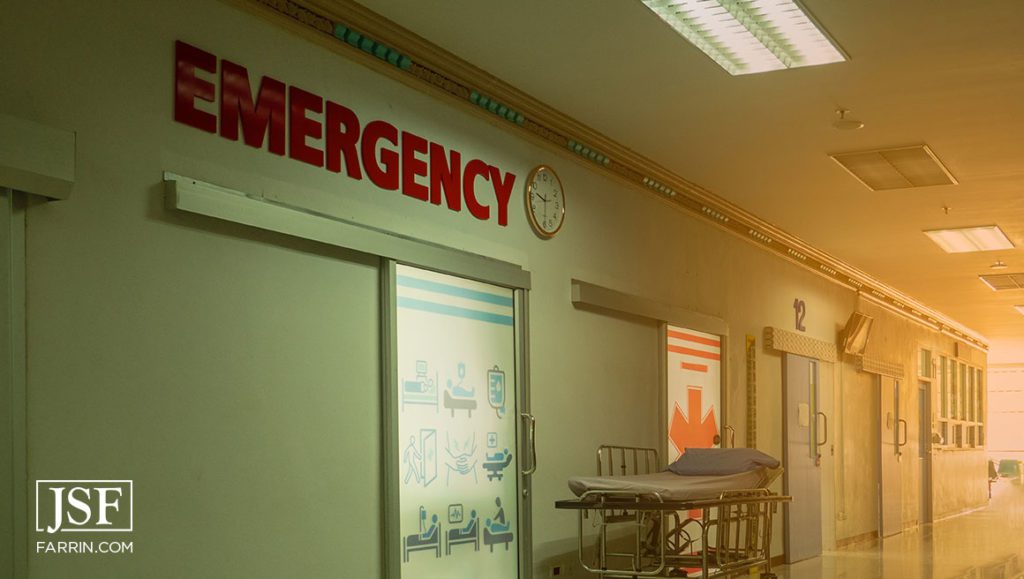One minute you’re driving and minding your own business, and the next, you’re injured in a car accident and need medical care. But what if you don’t have health insurance? You’ll have to negotiate with the at-fault driver’s insurance company for how much they may owe you for your damages – including the cost of your medical treatment.
This is important: The only way to prove the extent of your injuries is to get medical treatment. You have to show what it took to resolve your injury. Your medical treatment becomes your story of why the insurance company should compensate you.
When Does the Insurance Company Actually Pay You?
This “story” for trying to prove your case begins at the time of your injury and ends at the last date of your medical treatment. This is why you often have to wait until “maximum medical improvement” (or “MMI”) before the insurance company will talk about settling and paying your claim. You are just seeking reimbursement for all of the bills you’ve already had to pay.
Note: if the insurance company attempts to settle your injury claim before you are done treating, you are at risk of a lowball offer and should contact an attorney right away.
You may also have a right to be compensated for pain and suffering and lost wages.
How Can You Pay for Medical Care If You Don’t Have Health Insurance?
This is the problem many people face. Maybe you’re between jobs, or maybe you have a job that doesn’t include insurance and haven’t obtained any for yourself. Most doctors and other medical providers require payment at the time of service. If you don’t have health insurance, it may seem impossible to get medical treatment.
It’s not, and you absolutely must get care. Not only does your health depend on it, but your claim to potential compensation does as well. Here are types of care common in car accident injuries and how you can handle payment while you’re recovering and negotiating with the other driver’s insurance company.
 Emergency Room Visits
Emergency Room Visits
Why seek this care: You should not take chances if you’ve been hurt. It may be obvious, or it may be difficult for you to recognize the severity of your injuries. After a car accident, most injured people go to the emergency room (ER) for initial treatment. The ER visit needs to happen early in your treatment, preferably the day of the accident. Remember: you are protecting the connection between your accident and your injuries. You need to seek medical treatment as soon as possible for an injury resulting from the accident.
However, you should not go to the ER repeatedly because an ER is set up for emergency visits only, not for ongoing care. Essentially, if you are experiencing an emergency, by all means, go to the ER. If it is not an emergency, seek your care elsewhere. Multiple non-emergency treatments at the ER will risk the insurance company refusing to pay the excess bills.
What If I Just Go to Urgent Care Instead?
If you believe an urgent care clinic can handle your injuries, you’re free to choose that route. However, some serious injuries may not be apparent immediately. The stress of being involved in an accident can “mask” injuries, so you may not even realize you’re injured.
While an ER certainly has access to better technology and diagnostic equipment, the urgent care clinic will be far less costly. Understanding the trade-off is essential here. An urgent care clinic may not detect an injury that an ER would, but it will likely cost much less. We caution against cutting corners with your care.
Essentially, urgent care clinics are a cost-effective option for follow-up care after you’ve visited an ER and your injuries have been thoroughly checked. Appointments are more widely available, and urgent care clinics may also refer for further treatment.
How to pay without insurance: Some ERs will attach a “lien” to your bill. A lien means the provider will give you treatment without immediate payment, and instead collect it later, out of any future final settlement. The lien gives them a legal right to be paid directly out of your potential settlement.
Other ERs do not automatically attach a lien and instead try to collect payment at the regularly scheduled interval. If the ER tries to collect payment immediately, you should let them know your treatment resulted from a collision and the status of your case. Ask the ER to give you the option to pay the bill when the case is resolved. They may or may not agree.
If delay is not an option, offer to pay minimal amounts to keep the bill out of collections and then pay the balance once the case is resolved. The last thing you want is for the bill to be sent to collections, so stay in touch with the provider.
 Follow-up Care for Muscle Strains/Sprains
Follow-up Care for Muscle Strains/Sprains
Why seek this care: After the initial ER care, if you have general muscle strains and sprains, chiropractic treatment is usually a good option. The reason chiropractors are helpful is that they do a good job with soft tissue injuries, which are common after car accidents. Also, chiropractors are highly accessible: you can typically schedule an appointment within a day, which means you are protecting the connection between your accident and your treatment for the accident.
You do not need a referral to see a chiropractor. However, if the severity of your injury is a concern, asking your physician or care provider if they recommend chiropractic care could be a good idea.
Do not miss appointments – the insurance company may take that as a sign that the appointment wasn’t necessary. You should follow the chiropractor’s plan but constantly communicate with the chiropractor about what is working and what’s not.
How to pay without insurance: Most chiropractors will treat on a lien, or at least they may be more inclined to do so when an attorney is involved. Even if they won’t, they often will not require immediate payment. If they do not treat on a lien, speak to them about your situation and your case, and again if you must pay, pay as little as they will accept to keep the bill from collections.
Follow-up Care for More Serious Injuries
Why seek this care: If you suffered more serious injuries or don’t feel better after several weeks of consistent chiropractic care, you may need to seek medical attention from a family care doctor or specialist. Again, you should attempt to find whatever care or treatment you need to heal from your injury
How to pay without insurance: You may have to find a clinic or family care doctor who will treat you on a lien, and ask them for a referral to a specialist who can treat you on a lien. These providers can be difficult to find, but they can be invaluable to your case if they are available.
Some urgent care facilities will treat on a lien. You can also investigate free clinics and free medical providers in your area. There are usually links to these services through your local health department. Large providers in our area, like Duke University Health Systems and UNC Health Systems, often provide charitable care services for uninsured individuals.
Negotiating a Lien
If you get treatment on a lien, the extent to which a provider is paid is based on what you may be able to recover for the final settlement. If the provider is not paid in full, then you will be responsible for the rest. Sometimes, an attorney can negotiate with the lien holder to try to reduce the out-of-pocket expense to the client.
For example, once a victim’s case settles, if the medical provider is only scheduled to be reimbursed 70% of their bill, then the medical provider may agree not to charge the client for the remaining 30%. Having an experienced car accident attorney handling your case from the beginning means you have experienced representation and people experienced in negotiations working on your behalf.
How Can an Attorney Help You?
In many cases, it is important to have skilled representation that can help direct your case with your best interests at heart. Without an attorney, you risk making a mistake that could cost you. With our team of more than 50 attorneys, we have extensive knowledge to assist our clients without health insurance try to get the treatment they need.
Treatment on a lien is a highly complex arrangement. Having an attorney handle the case may help you avoid personal liability and may help you put more money in your pocket.
This is important because, as we said at the beginning, settlement is most often related to treatment. Our goal as attorneys is to try to ensure you get as much as possible as quickly as possible, and that’s especially important when you don’t have health insurance – you want to know those bills are going to be paid. We understand! We’ve represented more than 60,000 clients and recovered a total of more than $1.6 billion in compensation.1
If you’ve been injured, time is not on your side. Contact us online for a free case evaluation or call us at 1-866-900-7078. Remember, there’s no attorney’s fee unless we recover compensation for your claim.2
You May Also Be Interested In
Answers to the Most Frequent and Urgent Car Accident Injury Questions
Who Pays Medical Bills in a Car Accident in North Carolina?
The Top 6 Questions About Medical Care after Car Accidents
Who Pays for the Ambulance in a Car Accident? A Quick and Comprehensive Guide
Important Facts About North Carolina Car Accident Injury Claims



 Emergency Room Visits
Emergency Room Visits Follow-up Care for Muscle Strains/Sprains
Follow-up Care for Muscle Strains/Sprains
